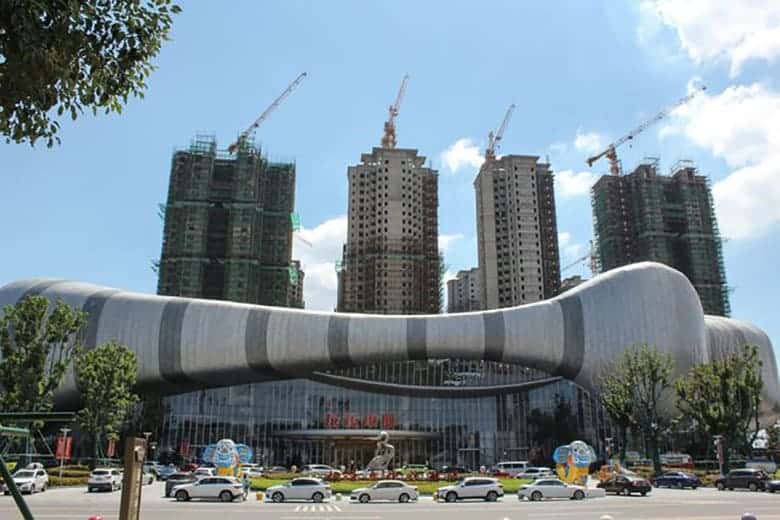
The policy measures focus in part on ensuring completion of projects like this Evergrande complex
A rescue package proposed by Chinese authorities on Friday may not be enough to spark immediate relief for investors in the country’s troubled developer bonds according to analysts from Goldman Sachs.
After China’s central bank and top banking regulator rolled out a 16-point real estate rescue package which included greater access to credit for developers and funding to ensure handover of new homes to buyers, executives from the white shoe US investment bank stressed that a full recovery for the industry may still be far away.
“We have argued that a recovery in China property high-yield will require a rebound in the physical property sector in China. It remains to be seen whether the reported measures will be sufficient to attain that, or whether they are designed to stabilize the market whilst avoiding releveraging in the sector,” Kenneth Ho, managing director and head of Asia credit strategy research at Goldman Sachs said in a note.
The bail-out programme was unveiled to financial institutions and policy-makers at the same time that the People’s Bank of China and the China Banking and Insurance Regulatory Commission asked banks to provide an additional $56 billion in financing for the property sector before the end of this year, according to media reports.
Support For “Quality” Developers
Despite the barrage of measures, Goldman’s team in Hong Kong sees broader market challenges potentially blunting the impact of the credit influx.

Kenneth Ho of Goldman Sachs
“Furthermore, property sector activities are likely to be impacted by slower growth in China, particularly with lingering uncertainties regarding the direction of the country’s covid policy,” Goldman’s Ho said.
The latest measures came just a few days after Beijing moved to loosen pandemic restrictions and announced RMB 250 billion ($34.5 billion) of expanded bond financing support for private developers. Many analysts see this as the first comprehensive supportive policy from central authorities, unlike previous piecemeal steps.
On Monday government provided more financial aid to selected builders by reopening access to cash derived from pre-sales of homes, which had been required to be moved into escrow accounts following reforms in recent years.
In a statement on its website, the China Banking and Insurance Regulatory Commission said it would allow “quality” developers to use up to 30 percent of pre-sale proceeds, in a move which would improve cashflow for approved builders.
Favourites Among Equals
Whilst the 16-point plan seen by Mingtiandi said lenders should support private and state-owned developers equally, the policy specifically mentioned that quality builders that focus on their core business and have sound governance should be prioritised.
“It is clear from the report that a blanket bailout is unlikely…As such, we believe that bailouts of over-levered developers are unlikely, and that policymakers remain very focused on moral hazard issues,” said Goldman Sachs’s Ho.
Ho added that the policy guidance, if implemented, will further reduce risks of further losses in the sector. The Goldman Sachs team also noted the programme’s emphasis on ensuring property completions, with the plan including a measure that encourages policy banks to offer special loans to developers struggling with home deliveries.
More Defaults to Emerge
The regulatory proposal specifies the use of market-based approaches for handling bankruptcy and restructuring, which suggests that more defaults will emerge, said Ho, with Chinese high-yield property bonds so far this year defaulting at a rate of 39 percent.
To ensure the delivery of homes, regulators said developers’ outstanding bank loans and trust borrowings due within the next 6 months can be extended for one more year beyond the current allowed period, with such extensions to be arranged via negotiations. “These affirm our view that the path towards restructuring of stressed companies is a long one,” said Goldman Sachs’s Ho.
Analysts at research firm China Real Estate Information Corp took a more upbeat view, judging that the measures will likely press a “pause button” on the ongoing wave of developer disasters.
A measure that delays the enforcement of caps on the proportions of property loans and home mortgage loans on the balance sheets of large banks will likely improve financing for developers, support home purchase activities, and help real estate sales to gradually stabilize, said CRIC in an article published on its official WeChat account.
Demand Remains Fragile
While the initiative launched on Friday represents the largest overhaul of real estate rules since China introduced the Three Red Lines measures restricting credit to the industry in 2020, major challenges remain.
“The rescue policy will help developers pay salaries to the migrant workers as the year’s end approaches. But it will not solve the problem that people don’t have money to buy houses because of the pandemic,” said an analyst from a real estate research firm in Shanghai, on condition of anonymity.
“Although the policy direction is given, it remains uncertain whether the measures will be carried out accordingly by the banks,” he added.
While the policies provide a developer lifeline, they overlook measures that could support demand by opening up the market to more buyers, such as cuts to the required down payment percentage or cancellation of hukou (permanent residence) requirements in major cities like Shanghai, the analyst said.
Note: This article have been indexed to our site. We do not claim legitimacy, ownership or copyright of any of the content above. To see the article at original source Click Here











